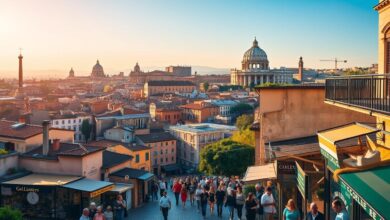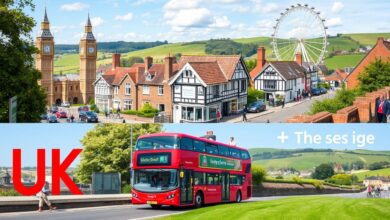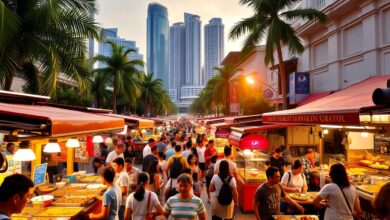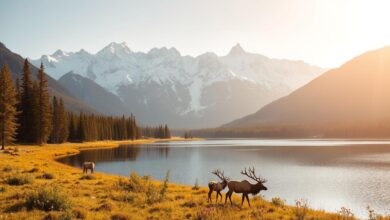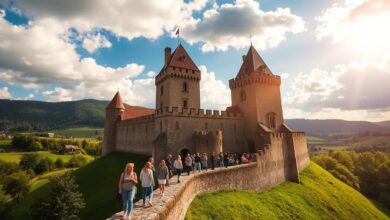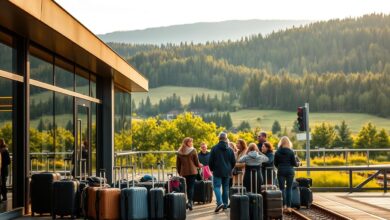New Zealand on a Budget: Step-by-Step Travel Tips for Adventurers
New Zealand is famous for its stunning landscapes and exciting adventures.
Anúncios
But, budget travelers might wonder how to see it all without spending too much. This guide is here to help, offering tips to save money and enjoy the country’s unique experiences.
By planning ahead, you can explore New Zealand’s beauty and excitement without overspending. It’s all about finding the right balance between adventure and affordability.
Introduction to New Zealand’s Budget Travel Scene
New Zealand is becoming a hotspot for budget travelers. It offers a mix of adventure and affordability. The country has a wide range of options for those who want to save money without missing out on fun.
Travelers can find budget-friendly places to stay, from cozy hostels to scenic campgrounds. This makes it easy for everyone to find a place that fits their style and budget.
Getting around New Zealand is also affordable. Buses, shuttles, and ferries make it easy to see the sights without spending a lot. This means you can explore both cities and countryside without breaking the bank.
New Zealand also has plenty of free activities. You can go hiking, sightseeing, or dive into the local culture. These options make traveling here both fun and budget-friendly.
Choosing the Best Time to Visit New Zealand
When planning a trip to New Zealand, it’s important to pick the right time. The climate, prices, and crowds vary by season. Knowing the best times can help you save money.
Summer in New Zealand, from December to February, is the peak tourist season. The weather is great for outdoor fun, but it’s also the busiest time. Prices for hotels and attractions go up a lot. If you’re watching your budget, it’s better to avoid this time.
The shoulder seasons, spring (September to November) and autumn (March to May), are ideal for those on a budget. The weather is nice, and prices are lower. You can find deals on places to stay and enjoy fewer crowds at popular spots.
For good deals, book your flights and hotels early. Also, look out for local events to save money. Knowing when prices and crowds change helps you plan better.
| Travel Seasons | Typical Weather | Price Level | Crowd Levels |
|---|---|---|---|
| Summer (Dec – Feb) | Warm and sunny | High | Very High |
| Autumn (Mar – May) | Cooler with fall colors | Medium | Medium |
| Winter (Jun – Aug) | Cold, some snow in the South | Lower | Low |
| Spring (Sep – Nov) | Fresh and blooming | Medium | Medium |
New Zealand Travel Guide: Essential Tips for Adventurers
Travelers to New Zealand should know about the local currency and costs. Understanding these can greatly affect their trip and budget. Looking for affordable places to stay helps save money, letting you enjoy New Zealand without spending too much.
Understanding Currency and Cost
The New Zealand dollar (NZD) is the local currency. Travelers should watch exchange rates, as they change. Major credit cards like Visa and Mastercard are accepted in cities. But, cash is better for small towns or rural areas.
Bargain Hunting for Accommodations
Looking for budget-friendly places to stay can make your trip better without breaking the bank. There are many options, from hostels to motels, to fit different tastes. Here’s a quick look at what’s available:
| Type | Average Cost (per night) | Description |
|---|---|---|
| Hostels | $20 – $50 | Shared dormitories, often with communal kitchens and social activities. |
| Motels | $70 – $120 | Private rooms with basic amenities, ideal for families or small groups. |
| Bed and Breakfasts | $60 – $150 | Cozy, home-like atmosphere, often includes breakfast in the cost. |
Book your stay early in busy seasons to get the best deals. Exploring different places like Auckland, Wellington, and Queenstown can help you find great deals without losing out on quality.
Affordable Transportation Options within New Zealand
Traveling around New Zealand offers many ways to get around, fitting different budgets and tastes. Knowing the good and bad of each option can make your trip better. You can pick from public transport, rental cars, or ride-sharing services, depending on what you need.
Public Transport vs. Rental Cars
In New Zealand, public transport includes buses, trains, and ferries. It’s a cheap way to get around cities and see famous spots. Places like Auckland and Wellington have good bus systems that take you where you need to go. The prices are fair, making it a smart choice if you don’t want to drive.
Rental cars give you freedom to see places you might not find on public transport. You can drive scenic routes at your own speed. But, you’ll have to pay for fuel, insurance, and parking, which can add up. Think about your travel plans before deciding between public transport and rental cars.
Utilizing Ride-Sharing Apps
Ride-sharing services are a handy option for those who like easy travel. Apps like Uber and Ola are common in New Zealand, offering good prices and easy booking. They’re great in cities where parking is hard.
Ride-sharing is also good for groups, as you can share the cost. It’s a simple way to get to your hotel or attractions without dealing with public transport or parking. New Zealand has options for everyone, making sure you find something that suits your travel style and budget.
Finding Budget-Friendly Accommodations
New Zealand has many budget-friendly places to stay. You can find deals on sites like Booking.com or Airbnb. These sites often have discounts and special offers.
Hostels are a great choice for those on a tight budget. They offer cheap prices and a lively atmosphere. Guests can meet other travelers and enjoy shared spaces like kitchens and game rooms.
Camping is another affordable option. New Zealand’s beautiful outdoors make it perfect for camping. Campsites have basic facilities, making them a cost-effective choice.
Exploring New Zealand’s Natural Wonders for Free
New Zealand is full of free activities, letting adventurers enjoy its beautiful landscapes without spending a lot. The country’s natural beauty is seen in many hiking trails and stunning national parks. Each place offers unforgettable experiences for those who explore.
Hiking Trails and Scenic Spots
Outdoor lovers will find many hiking trails in New Zealand. Trails like the Tongariro Alpine Crossing and the Abel Tasman Coast Track offer amazing views and scenery. They are perfect for all skill levels, from beginners to experienced hikers.
Discovering hidden gems and scenic spots is thrilling. It’s a favorite activity for travelers who want to see New Zealand’s diverse landscapes.
National Parks and Their Attractions
National parks in New Zealand attract those looking for adventure without spending money. Parks like Fiordland and Mount Cook National Park have stunning views and hiking trails. These trails show off the unique plants and animals of the area.
Visitors can explore these natural wonders and enjoy the free activities New Zealand offers. Whether it’s a walk through lush forests or a challenging mountain trek, the national parks have captivating attractions. They create lasting memories for all who visit.
Eating on a Budget: Savvy Food Tips
Dining in New Zealand can be pricey. But with smart planning, you can enjoy tasty meals without breaking the bank. It’s all about finding the right mix of grocery shopping and dining out.
Grocery Shopping versus Dining Out
Shopping for groceries is often cheaper than eating out. Stores like Countdown and Pak’nSave have great deals. Plus, local markets offer fresh, affordable produce.
- Cost-effective meals: Cooking at home saves money. Rice, pasta, and canned goods are cheap and easy to find.
- Meal plans: Planning meals helps avoid unnecessary spending and food waste.
- Eating out strategically: Try food trucks and casual places for tasty, budget-friendly meals.
Let’s look at the cost difference between shopping for groceries and eating out:
| Food Option | Average Cost (NZD) |
|---|---|
| Home-cooked meal (per serving) | $7 |
| Fast food meal | $15 |
| Casual dining meal | $25 |
| Grocery shopping (weekly budget) | $100 |
Knowing these prices helps you make better food choices. By smart shopping and dining, you can enjoy New Zealand’s food scene without spending too much.
Experiencing Local Culture without Breaking the Bank
Traveling in New Zealand is a great way to dive into its rich culture without spending a lot. There are many affordable experiences that let you explore the local culture. You can enjoy everything from local festivals to art galleries without spending a lot.
Every area in New Zealand has local events that celebrate its traditions, art, and food. Big cities like Auckland and Wellington have beach concerts, street markets, and cultural festivals all year. These events are fun and give you a peek into the local way of life.
Many museums and art galleries offer free or cheap entry. They show off historical items and modern art that shows off New Zealand culture. For example, the Te Papa Tongarewa museum in Wellington lets you learn about New Zealand’s history and nature for free.
Community events like farmers’ markets also let you connect with locals. These markets have artisans selling handmade goods and traditional foods. It’s a great way to dive into local culture and enjoy affordable experiences.
In short, experiencing New Zealand’s local culture is easy and rewarding. Every event, gallery, and gathering opens a door to the heart of the country. It invites travelers to explore and celebrate New Zealand’s diversity without spending a lot.
Conclusion
Planning a budget-friendly trip to New Zealand is definitely doable. The tips shared show how smart planning can lead to amazing experiences without breaking the bank. You can enjoy the stunning landscapes and cultures without spending too much.
When planning, think about where to stay, how to get around, and what to do for free. Activities like hiking and visiting national parks are great options. These choices let you see New Zealand’s beauty and culture without overspending.
New Zealand has so much to offer, from scenic trails to delicious food and friendly people. With some planning, you can have a memorable and affordable trip. So, get ready to explore New Zealand’s wonders without spending a lot.
For more information, see the official travel site:
You will be redirected to another website
FAQ
What is the best time to visit New Zealand for budget travelers?
Budget travelers should visit New Zealand in spring (September to November) and autumn (March to May). These shoulder seasons offer mild weather, fewer tourists, and lower prices. You’ll find better deals on places to stay and things to do.
What are some budget-friendly accommodation options in New Zealand?
Look for hostels, motels, and campgrounds for affordable stays. Websites like Booking.com and Airbnb have great deals. Hostels offer cheap dorms, and campgrounds let you enjoy nature without spending much.
How can travelers save on transportation in New Zealand?
Use public transport like buses and trains for cheap travel. Rent-a-car services can be pricey, but ride-sharing apps are a cost-effective option. Traveling during off-peak times can also save you money.
Are there free activities available in New Zealand?
Yes, New Zealand has plenty of free activities. You can hike, explore national parks, and see stunning views without spending a dime. These spots are perfect for experiencing the country’s beauty on a budget.
What are some tips for eating on a budget in New Zealand?
To save money, shop for groceries instead of eating out. Local markets and food trucks offer tasty, affordable meals. This way, you can enjoy New Zealand’s food scene without overspending.
How can travelers engage with local culture without overspending?
Enjoy local culture by attending free or low-cost events. Visit art galleries and museums on free days. This lets you dive into New Zealand’s heritage without spending a lot.
Published on: 12 de April de 2025

